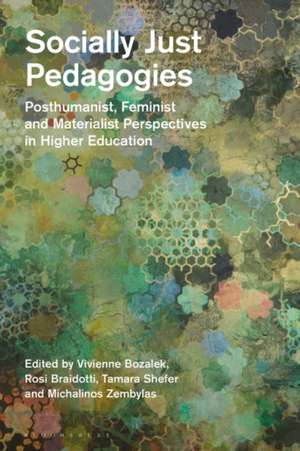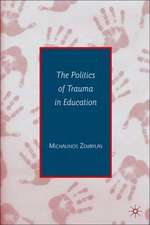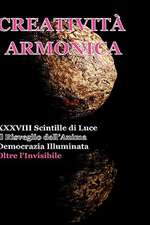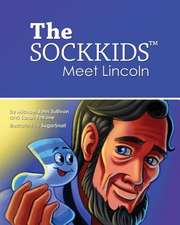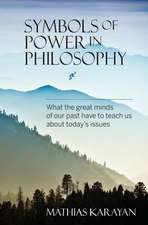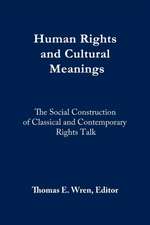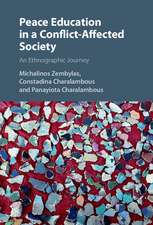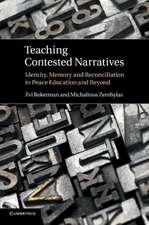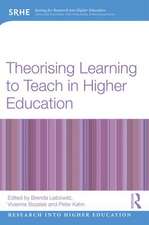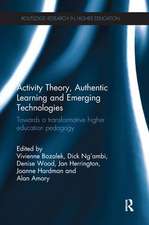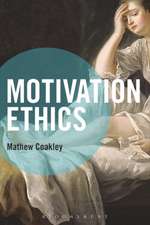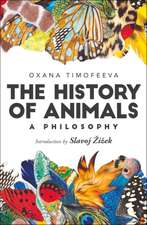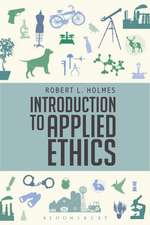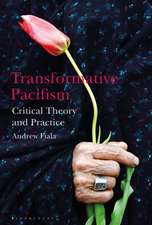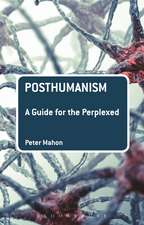Socially Just Pedagogies: Posthumanist, Feminist and Materialist Perspectives in Higher Education
Editat de Professor Rosi Braidotti, Vivienne Bozalek, Tamara Shefer, Michalinos Zembylasen Limba Engleză Hardback – 13 iun 2018
| Toate formatele și edițiile | Preț | Express |
|---|---|---|
| Paperback (1) | 231.24 lei 6-8 săpt. | |
| Bloomsbury Publishing – 25 dec 2019 | 231.24 lei 6-8 săpt. | |
| Hardback (1) | 715.66 lei 6-8 săpt. | |
| Bloomsbury Publishing – 13 iun 2018 | 715.66 lei 6-8 săpt. |
Preț: 715.66 lei
Preț vechi: 915.31 lei
-22% Nou
Puncte Express: 1073
Preț estimativ în valută:
136.94€ • 149.22$ • 115.39£
136.94€ • 149.22$ • 115.39£
Carte tipărită la comandă
Livrare economică 24 aprilie-08 mai
Preluare comenzi: 021 569.72.76
Specificații
ISBN-13: 9781350032897
ISBN-10: 1350032891
Pagini: 264
Dimensiuni: 156 x 234 x 27 mm
Greutate: 0.54 kg
Editura: Bloomsbury Publishing
Colecția Bloomsbury Academic
Locul publicării:London, United Kingdom
ISBN-10: 1350032891
Pagini: 264
Dimensiuni: 156 x 234 x 27 mm
Greutate: 0.54 kg
Editura: Bloomsbury Publishing
Colecția Bloomsbury Academic
Locul publicării:London, United Kingdom
Caracteristici
Combines philosophical and theoretical essays with research-based chapters, including work funded by the National Research Foundation (NRF) of South Africa
Notă biografică
Vivienne Bozalek is Professor of Social Work and the Director of Teaching and Learning at the University of the Western Cape, South Africa. Rosi Braidotti is Distinguished University Professor and founding Director of the Centre for the Humanities at Utrecht University, The Netherlands. Tamara Shefer is Professor of Women's and Gender Studies and currently Deputy Dean of Teaching and Learning in the Faculty of Arts at the University of the Western Cape, South Africa. Michalinos Zembylas is Professor of Educational Theory and Curriculum Studies at the Open University of Cyprus.
Cuprins
Notes on ContributorsAcknowledgementsForeword by Rosi Braidotti, Utrecht University, The Netherlands IntroductionVivienne Bozalek, University of the Western Cape, South Africa, Michalinos Zembylas, Open University of Cyprus, Cyrus, and Tamara Shefer, University of the Western Cape, South AfricaSection 1: Theoretical PerspectivesChapter 1. '#Itmustallfall, or, Pedagogy for a People to Come'Chantelle Gray van Heerden, University of South Africa, South AfricaChapter 2. 'Feminism and Feminist Studies in Neoliberal Times: Furthering Social Justice in Higher Education Curricula'Rosemarie Buikema Utrecht University, The Netherlands and Kathrin Thiele, Utrecht University, The NetherlandsChapter 3. 'Practicing reflection or Diffraction? Implications for Research Methodologies in Education'Vivienne Bozalek, University of the Western Cape, South Africa and Michalinos Zembylas Open University of Cyprus, CyrusChapter 4. 'The Politics of Animality and Posthuman Pedagogy'Delphi Carstens, University of the Western Cape, South AfricaSection 2: Ethics and Response-ability in Pedagogical PracticesChapter 5. Each Intra-Action Matters: Towards a Posthuman Ethics for Enlarging Response-ability in Higher Education Pedagogic Practice-ingsCarol A. Taylor, Sheffield Hallam University, UKChapter 6. 'A Pedagogy of Response-ability'Vivienne Bozalek, University of the Western Cape, South Africa, Abdullah Bayat, University of the Western Cape, South Africa, Daniela Gachago, Cape Peninsula University of Technology, South Africa, Siddique Motala, University of the Western Cape, South Africa, and Veronica Mitchell, University of Cape Town, South Africa Chapter 7. 'Me Lo Dijo Un Pajarito - Neurodiversity, Black Life and the University As We Know It'Erin Manning, Concordia University, CanadaChapter 8. 'An Ethico-Onto-Epistemological Pedagogy of Qualitative Research: Knowing/Being/Doing in the Neoliberal Academy'Candace R. Kuby, University of Missouri, USA and Rebecca C. Christ, University of Missouri, USASection 3: 'Locating Social Justice Pedagogies in Diverse Contexts'Chapter 9. 'Finding Child beyond 'Child': a Posthuman Orientation to Foundation Phase Teacher Education in South Africa'Karin Murris, University of Cape Town, South Africa and Kathryn Muller, University of Cape Town, South AfricaChapter 10. 'Embodied Pedagogies: Performative Activism and Transgressive Pedagogies in the Sexual and Gender Justice Project in Higher Education in Contemporary South Africa'Tamara Shefer, University of the Western Cape, South AfricaChapter 11. 'Narrative Vases as Markers of Subjectivity, Agency and Voice: Engaging Feminist Pedagogies Within the Context of #feesmustfall'Nike Romano, University of Cape Town, South AfricaChapter 12. 'Thebuwa and a Pedagogy of Social Justice: Diffracting Multimodality through Posthumanism'Denise Newfield, University of the Witwatersrand, South Africa Index
Recenzii
Continuing the most exciting and challenging histories of engaged feminist thought, the chapters in Socially Just Pedagogies grapple with the lived histories of inequality-structured by race, gender, sexuality, coloniality, and age-and use specific sites of educational struggle as occasions to test and transform the ways we understand materiality, subjectivity, and most importantly the social. Without ever losing touch with the intra-human violences that structure global relations, the authors forcefully re-imagine pedagogy as always more-than-human. This incredible book makes the case that feminist education is constitutively materialist and nonhumanist, and that new materialist politics are inescapably pedagogical.
A strong case for the theoretical input of posthuman and affect theory, this is new to the field of educational studies and is much needed. The authors have produced a fine piece of work. This should be a big player in the critical educational literature.
It's about time we had a book like this, that tackles education's unswerving adherence to outdated 20th century humanist premises. The most apparent strength is the editors' (and contributors') strong grasp on the posthumanist, affective and new materialist theoretical perspectives that frame this collection. The emphasis on southern perspectives is very refreshing and will make a unique contribution to the broader posthumanist educational field, which is dominated by global north theorists and research. Particularly interesting because it also documents the recent student activism in South African universities, these challenges to the humanist norms of educational practice are overdue. This book is one of the first ones to make the challenges - others will follow.'
A strong case for the theoretical input of posthuman and affect theory, this is new to the field of educational studies and is much needed. The authors have produced a fine piece of work. This should be a big player in the critical educational literature.
It's about time we had a book like this, that tackles education's unswerving adherence to outdated 20th century humanist premises. The most apparent strength is the editors' (and contributors') strong grasp on the posthumanist, affective and new materialist theoretical perspectives that frame this collection. The emphasis on southern perspectives is very refreshing and will make a unique contribution to the broader posthumanist educational field, which is dominated by global north theorists and research. Particularly interesting because it also documents the recent student activism in South African universities, these challenges to the humanist norms of educational practice are overdue. This book is one of the first ones to make the challenges - others will follow.'
